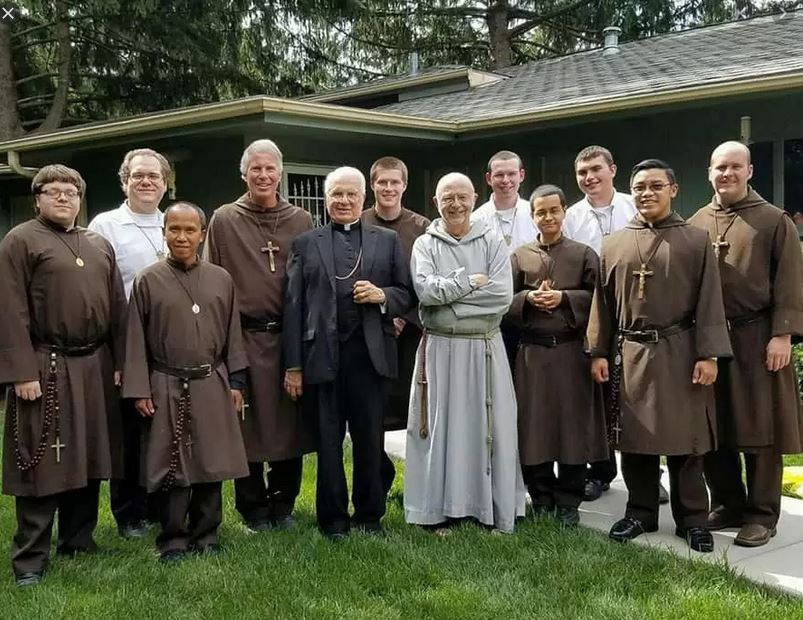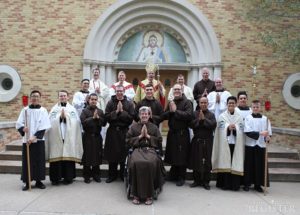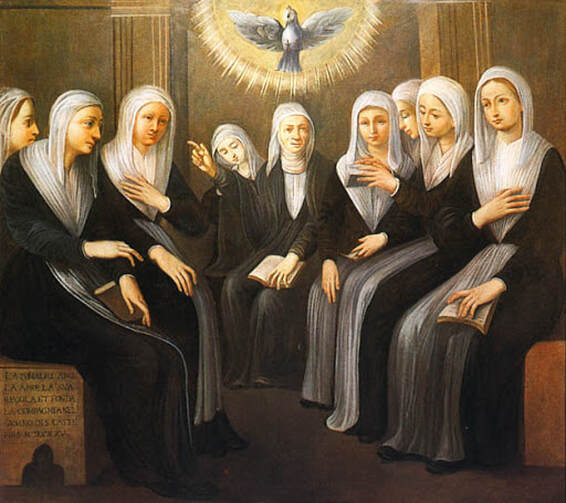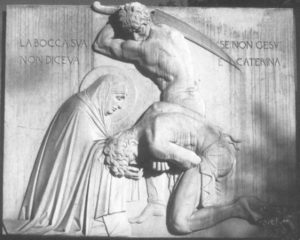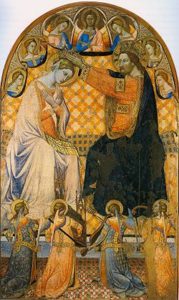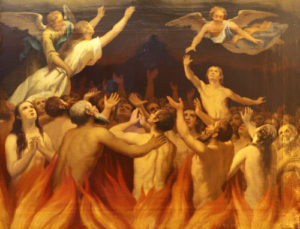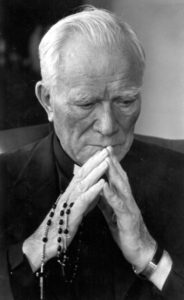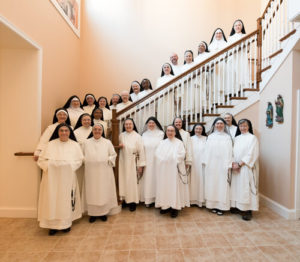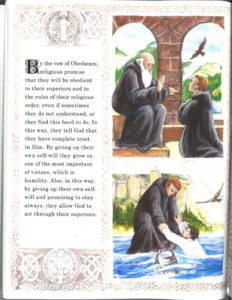40 Days of Prayer
Help us to “Wake Up the World!”
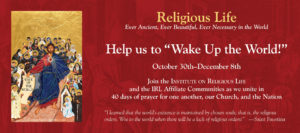
From October 30th – December 8th, more than 40+ IRL communities will be praying for you! Each day, a different community will praying intentionally for the needs of the IRL, our friends and benefactors, and for the Church and the Nation, in this hour of need!!
We ask you in return to pray for religious life, especially for religious vocations!
Communities joined in prayer……
Oct. 30 Benedictine Monks of Conception Abbey
Conception, Missouri
Oct. 31 Sisters of St. Francis of the Holy Eucharist
Independence, Missouri
Nov. 1 Daughters of St. Mary of Providence
Lake Zurich, Illinois
Nov. 2 Sisters of Charity of Our Lady Mother of the Church
Baltic, Connecticut
Nov. 3 Carmel of the Immaculate Heart of Mary
Salt Lake City, Utah
Nov. 4 Franciscan Brothers of Brooklyn
Brooklyn, New York
Nov. 5 The Poor Clares of St. Clare’s Monastery
Sauk Rapids, Minnesota
Sons of Our Mother of Peace
High Ridge, Missouri
Nov. 6 Cistercian Nuns of Valley of Our Lady Monastery
Prairie du Sac, Wisconsin
Nov. 7 Monastery of the Visitation of Holy Mary
Snellville, Georgia
Nov. 8 Carmelite Nuns of the Ancient Observance
Wahpeton, North Dakota
Nov. 9 Franciscan Sisters of Christian Charity
Manitowoc, Wisconsin
Nov. 10 St. Procopius Benedictine Abbey
Lisle, Illinois
Nov. 11 Sisters of the Most Holy Soul of Christ the Lord
Stuart, Florida
Nov. 12 Discalced Carmelites Nuns of Rochester
Pittsford, New York
Carmelite Monastery of Mary, Mother of Grace
Lafayette, Louisiana
Nov. 13 Our Lady of Mt. Thabor Dominican Monastery Ortonville, Michigan
Nov. 14 Carmelite Hermits of St. Mary of Carmel
Houston Minnesota All Carmelites Saints Day
Nov. 15 Dominican Friars – Most Holy Name of Jesus Province
Oakland, California
Holy Spirit Adoration Sisters
Saint Louis, Missouri
Nov. 16 Sisters of the Holy Cross
Carrollton, Ohio
Abbey of the Genesee
Piffard, New York
Nov. 17 Sisters of St. Joseph the Worker
Walton, Kentucky
Nov. 18 Sisters of the Visitation
Toledo, Ohio
Nov. 19 Poor Clare Colettine Nuns
Palos Park, Illinois Feast of St. Agnes
Nov 19 Poor Clare Colettine Nuns
Cleveland, Ohio
Nov. 20 Poor Clare Monastery of Our Lady of Mercy
Belleville, Illinois
Nov. 21 Father Kolbe Missionaries
Peoria, Illinois
Carmelite Monastery of Our Lady of Guadalupe
Ada, Michigan
Nov. 22 Carmelite Monastery of Our Lady and Saint Therese
Carmel, California
Poor Clares of Perpetual Adoration
Hanceville, Alabama
Nov. 23 Servants of Mary, Ministers to the Sick
Kansas City, Kansas
Carmelites of the Divine Heart of Jesus
Kirkwood, Missouri
Nov. 24 Discalced Carmelite Monastery
Santa Fe, New Mexico
Nov. 25 Olivetan Benedictine Sisters
Jonesboro, Arkansas
Nov. 26 Conventual Franciscan Friars
Ellicott City, Maryland
Nov. 27 Disciples of the Lord Jesus Christ
Boys Ranch, Texas
Nov. 28 Marian Sisters of Santa Rosa
Santa Rosa, California
Nov. 29 Maronite Monks of Adoration
Petersham, Massachusetts
Nov. 30 Discalced Carmelites Nuns
Dallas, Texas
Maronite Monks of Adoration/Fr Raphael Magee
Petersham, Massachusetts
Dec. 1 Little Sisters of the Poor
San Pedro, California & Palatine, Illinois
Maronite Monks of Adoration/Fr Maron Henricks
Petersham, Massachusetts
Dec. 2 Carmelite Monastery of the Infant Jesus of Prague
Traverse City, Michigan
Dec. 3 Order of the Blessed Virgin Mary of Mercy
Cleveland, Ohio
Carmelites of the Divine Heart of Jesus
Milwaukee, Wisconsin
Dec. 4 Carmel of the Assumption
Latrobe, Pennsylvania
St. Bonaventure Province/Conventual Franciscans
Chicago, Illinois
St. Clare’s Monastery
Mission, British Columbia
Dec. 5 Passionist Nuns of St. Joseph Monastery
Whitesville, Kentucky
Dec. 6 Sister Adorers of the Precious Blood
Manchester, New Hampshire
Dec. 7 Congregation of Norbertine Sisters
Wilmington, California
Dominican Monastery of the Infant Jesus Lufkin, Texas
Dec. 8 Knights of the Holy Eucharist
Waverly, Nebraska
Parish Visitors of Mary Immaculate
Monroe, New York
May God bless us all!
Like this:
Like Loading...
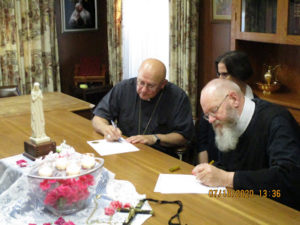 On October 7, 2020, the Feast of Our Lady of the Holy Rosary, The Sons of the Most Holy Redeemer (or F.SS.R. : Filii Sanctissimi Redemptoris) was granted a canonical invitation to establish a monastery in the diocese of Great Falls – Billings, Montana. Most Rev. Michael Warfel and Fr. Michael Mary signed the papers bringing this flowering of religious life from Scotland to America.
On October 7, 2020, the Feast of Our Lady of the Holy Rosary, The Sons of the Most Holy Redeemer (or F.SS.R. : Filii Sanctissimi Redemptoris) was granted a canonical invitation to establish a monastery in the diocese of Great Falls – Billings, Montana. Most Rev. Michael Warfel and Fr. Michael Mary signed the papers bringing this flowering of religious life from Scotland to America. Two months later, the community, also known as the Transalpine Redemptorists, purchased 200 acres in Forsyth, Montana, with the intention of building a future monastery there for their American foundation. The house will begin with four members of the order. The name they have given to the property is Montana Rosa Mystica. The Gospel on the day of the purchase read: Exsurgens autem Maria in diebus illis, abiit in montana cum festinatione (And Mary rising up in those days, went into the hill country with haste). “
Two months later, the community, also known as the Transalpine Redemptorists, purchased 200 acres in Forsyth, Montana, with the intention of building a future monastery there for their American foundation. The house will begin with four members of the order. The name they have given to the property is Montana Rosa Mystica. The Gospel on the day of the purchase read: Exsurgens autem Maria in diebus illis, abiit in montana cum festinatione (And Mary rising up in those days, went into the hill country with haste). “ Papa Stronsay is a small island in Orkney, Scotland, and the name derives from Papey minni ( little Priests’ Island from the Old Norse). After a 700 year absence, priests came back to Papa Stronsay and now they have a little island in rural Montana.
Papa Stronsay is a small island in Orkney, Scotland, and the name derives from Papey minni ( little Priests’ Island from the Old Norse). After a 700 year absence, priests came back to Papa Stronsay and now they have a little island in rural Montana.
